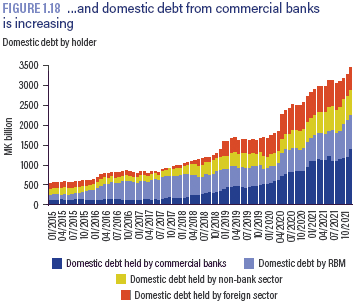Economists have warned Treasury to tread carefully on continued domestic borrowing despite having pressure to fund a number of activities at a time the economy is tanking.
Their comments come on the back of figures contained in investment advisory firm Bridgepath Capital reports showing that within five months of this fiscal year, Treasury has borrowed K612 billion or 94 percent of the planned K653.9 billion to be borrowed domestically.
In the 2022/23 National Budget that runs up to March 31 next year, Minister of Finance and Economic Affairs Sosten Gwengwe said this fiscal year’s planned budget deficit is K884 billion, which is 7.7 percent of the country’s gross domestic product (GDP).
The deficit is expected to be financed through domestic borrowing amounting to K653.9 billion and foreign borrowing amounting to K230.07 billion.
Speaking in an interview yesterday, economics commentator Exley Silumbu said that while there is pressure to fund a lot of activities, what is concerning is such borrowing is coming at a time when the economy is not performing well.
“What is also at stake are issues of conditions of international financing organisations, which have limits for borrowing. Government thus has to watch out for these for fear of violating the same, especially when we are pushing for a deal,” he said.
Silumbu, who is former University of Malawi economics lecturer, indicated that such borrowing could increase the debt burden on government as well as crowding out the private sector.
Money market analyst Cosmas Chigwe warned Treasury to be cautious when it borrows on the domestic market to avoid pushing up interest rates.
He said: “Government has to be cautious with domestic borrowing as it is expensive, inflationary in the long-term and continues to crowd out the private sector in the finance markets.
“In an ideal situation, banks should be directing this liquidity to industrialisation efforts. The domestic debt is rising at a time our debt sustainability is already one of the challenges raised in meeting the key International Monetary Fund’s Extended Credit Facility programme.”
Malawi University of Business and Applied Sciences associate professor of economics Betchani Tchereni said that the major concern is and has always been costs and terms of such loans.
“As we have always indicated, domestic borrowing is first expensive and second difficult to service. With the devaluation of the kwacha and the not-so-good revenue collection, it means that government activities are ongoing based on borrowing,” he said.
Bridgepath Capital Limited Monthly Economic Review Report shows that in April, the first month of this fiscal year, Treasury raised K60 billion from the domestic market before raising the figure to K122 billion in May and K182 billion in June.
The data further shows that Treasury borrowed K51 billion in July and K197 billion in August from the domestic market.
Meanwhile, published figures by Treasury indicate that total public debt stock as at December 31 2021 stood at K5.8 trillion or 56.8 percent of the rebased GDP compared to a stock of K5.45 trillion or 58.8 percent of GDP in June 2021.
In its recent Malaw i Economic Monitor, the World Bank warned that the consistent financing of fiscal deficits by high cost domestic borrowing has led to a recent surge in domestic debt and is expected to rise further.
Malawi’s domestic debt, currently at K2.8 trillion, increased from 17.5 to 21.9 percent of GDP from 2019 to 2020, according to World Bank figures. n
The post Tread carefully on domestic borrowing appeared first on The Nation Online.
 Moni Malawi
Moni Malawi 

